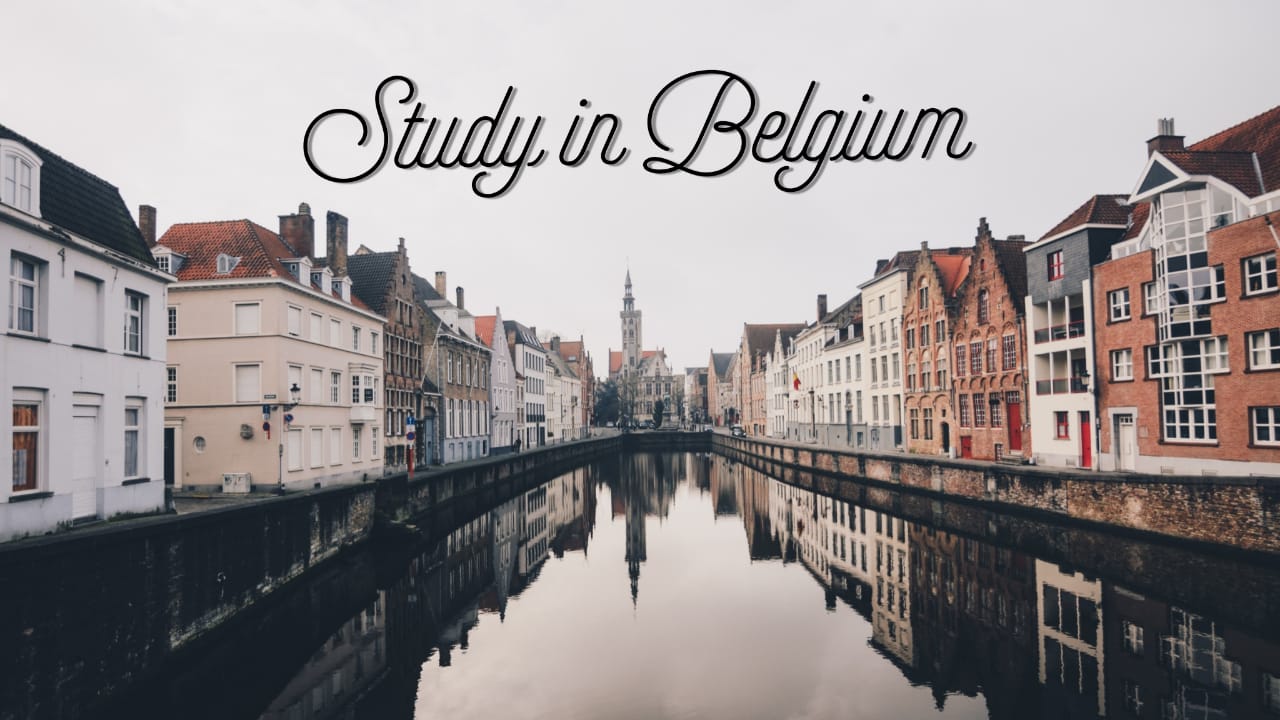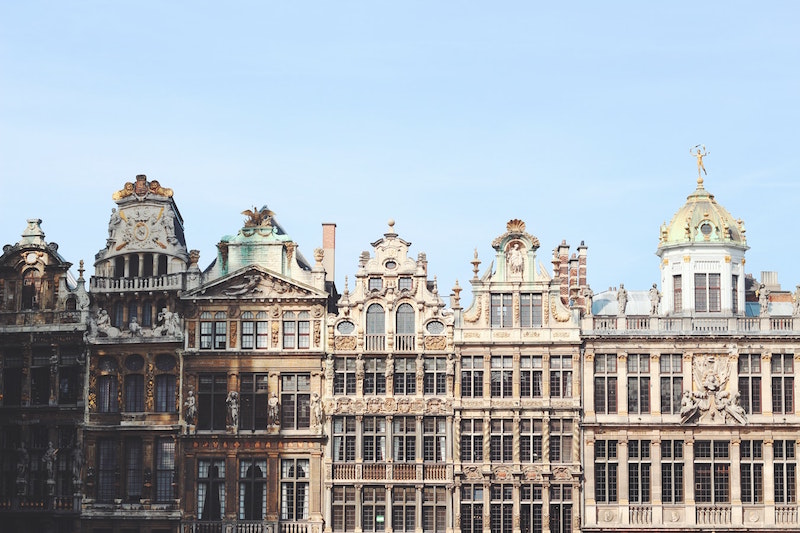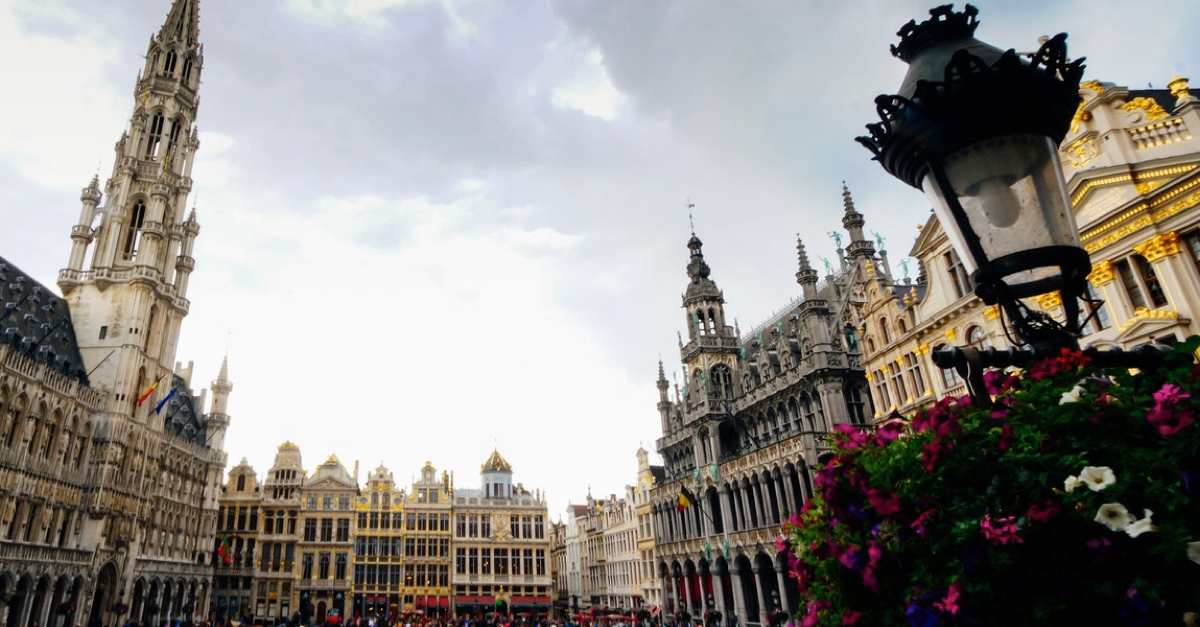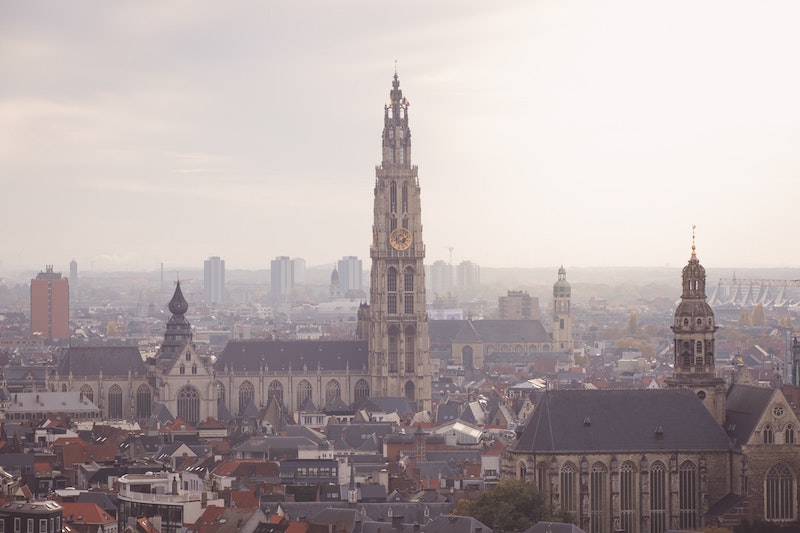
Study in Belgium
Last edited on 17 Feb 2026
Introduction on Country Represented
Welcome to Belgium!
Bordered by Germany, France, Luxembourg and the Netherlands, Belgium is a Federal State, divised in three regions and three linguistic communities. Home to European Union institutions as well as international organizations such as the NATO, Belgium has a friendly, cosmopolitan, and multicultural society right in the heart of Europe, very exciting for international students. Belgium hosts world renowned higher education institutions, among the best in Europe.
Description of the Higher Education System
There is on the one hand the universitary education and in the other the non-universitary one. Universities offer long-term education programmes made up of minimum two cycles (three with PhD). Non universitary formations are provided by the university colleges (Hautes Ecoles) and Schools of Arts, made up of 1 (short-term) to 2 cycles (long-term) liaising closely with applied research, universities, and socio-professional environments.
Application, Fees and Visas
Applications are sent directly to the higher education institution of your choice. Admission requirements in Belgium will vary depending on which community your institution is located. The institution will examine the submitted documentation, will check whether you are eligible for the study program or course you applied for, will inform you on whether you have to pass an admission or aptitude test, and will issue a letter of acceptance in case you are finally admitted. In general, students have to pay inscription ; on average, internationals can expect to pay anywhere between 800 and 4,000 EUR per academic year. If you are not a European citizen, you will need to apply for a student visa in Belgium before your arrival, if your stay exceeds 90 days (Type D long-stay visa). If you stay in Belgium for less than three months, then you will need a Type C short-stay visa. European nationals don’t need a visa or residence permit in order to stay and study in Belgium. You will just need to have your personal identification or passport with you during your stay and also register at the city hall after your arrival, if you intend to stay more than three months.
Tuition Fees
In the Wallonia-Brussels Federation, the annual cost of higher education studies ranges between €8,000 and €12,000. However, to make sure that these fees are not an obstacle for young men and women wishing to embark on higher education, the government pays almost all of them. The student will just have to pay the tuition fees. Their maximum limits are set by the Wallonia-Brussels Federation and depend on the type of higher education institution (university, university college, school of arts).
Tuition fees for universities :
From the academic year 2023-2024, students from outside the European Union will need to pay increased tuition fees, for which the annual amount is set at €2,505.
Tuition fees for university colleges and schools of arts in French-speaking Belgium :
In university colleges and schools of arts in the Wallonia-Brussels Federation, the amount of tuition fees will depend on the type of studies, the year concerned and the student’s status:
Students who are not European Union nationals will be required to pay specific tuition fees:
• for Professionally-oriented higher education: €992
• for Academic-oriented higher education, 1st study cycle: €1,487
• for Academic-oriented higher education, 2nd study cycle: €1,984
For more details :
https://www.studyinbelgium.be/en/studying-french-speaking-belgium-registration-fees
Scholarships
Discover the scholarships : https://www.studyinbelgium.be/fr/bourses
Living Cost
In Belgium you can either live in a student dormitory within a university campus or rent a private accommodation. If you are able to find a spot in a university student dormitory, then prices start only from 200 EUR per month. If you are interested in student private accommodation, it will cost you between 300-500 EUR per month The cost of living in Belgium is student-friendly and affordable. Books and study materials will cost you around 50 EUR per month, depending on the program you are studying and supermarket expenses around 300 EUR per month. For comparison, a cinema ticket is 11€, transports are up to 20€ per month for students, a beer costs between 2 and 5€, a coffee is on average 3€.
Work
In Belgium, all foreign students, even if from outside the European Economic Area, can work while studying. The only conditions are that they must be enrolled with a higher education institution in the Wallonia-Brussels Federation and must have a valid residence permit. Since 2018, there is no longer any need to request a work permit, you only need the essential “single permit”. During the academic year the student can work 20 hours per week. During school holidays (Christmas, spring, summer - July, August, September): the student can work with no limit to the number of hours.
Life After Studies
After sudies, the student can apply for a one-year visa to find a job.
Fast Facts
- Many belgian universities are top-ranked.
- The cities themselves provide a great experience for international students (21% of international students).
- Because Brussels houses the European Parliament, it has many international opportunities for post-degree employment and even just networking.
- In Belgium, student's performance is assessed according to a grade point scale that ranges from a minimum passing grade of 10 to a maximum of 20 points.
- University lectures usually have a fixed schedule. Your professors are all experts in their field and encourage students (particularly internationals) to ask questions. You will be involved in plenty of research work and can also join internships with local companies.
Universities in Belgium
Student Cities in Belgium
Brussels
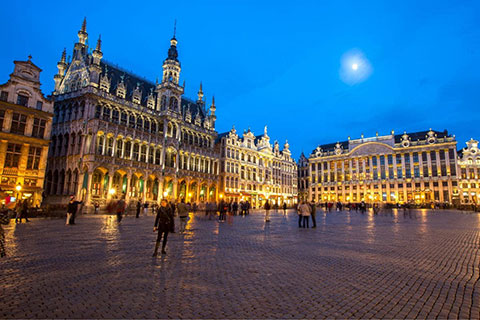
Belgium’s capital has often called the ‘Capital of Europe’, due to the many international organizations that call Brussels home. Since World War II, it has become the administrative center of organizations including the European Union (EU), the North Atlantic Treaty Organization (NATO), the World Customs Organization and EUROCONTROL, to name only a few. So, if you intend to study politics, international relations or perhaps translation studies, Brussels is probably your go-to Belgian city.
The city itself goes beyond its reputation as a center of administration and bureaucracy, offering a thriving nightlife, a world-class collection of restaurants, cafés, bistros and bars, and a unique selection of shopping experiences including open air markets and ‘galleries’ – the latter are historic, covered shopping streets. Although smaller than most European capitals, cosmopolitan and multilingual Brussels offers plenty in the way of culture and recreation.
Notable universities in Brussels include the Dutch-speaking Vrije Universiteit Brussel (VUB), ranked 182nd in the QS World University Rankings® 2016-2017, and the French-speaking Université Libre de Bruxelles (ULB) which is ranked joint 216th. As both of these universities translate into English as the ‘Free University of Brussels’, the translation is rarely used to refer to either university. Other prominent universities in Brussels include Facultés Universitaires Saint-Louis, Hogeschool-Universiteit Brussel and the Royal Military Academy. Several international universities also have campuses in Brussels, including the University of Kent’s Brussels School of International Studies and Boston University Brussels.
Leuven
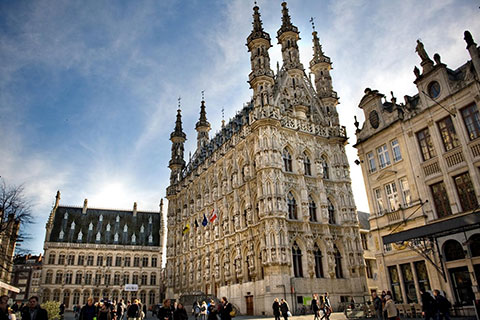
Home to the world’s largest brewer group (Anheuser-Busch InBev), and one of the largest hospitals in Europe (UZ Leuven), Leuven is also known for its notable medieval buildings, annual summer music festival Martrock and its famous Arenberg Orchestra, one of many orchestras based in Leuven. The city also has a rich beer culture, with bars offering a wide variety of local and international varieties – including one bar that claims to offer more than 3,000 different beers! Make sure to pay a visit to the Oude Markt and its numerous pubs, bars and cafés, which have earned it the title of the ‘the longest bar in the world’. While you’re there, see if you can spot the nearby Fons Sapientiae (fountain of wisdom), a famous symbol of Leuven’s student city status.
During term-time, students are a major presence in the city. Leuven is home to the highest-ranked Belgian university, Katholieke Universiteit Leuven (currently 79th in the QS World University Rankings). Also known as KU Leuven or the University of Leuven, this is Belgium’s largest university, with more than 57,300 students. It’s also believed to be the oldest university in Belgium, and the world’s oldest Catholic university still in existence.
Other universities in Leuven include the autonomous Vlerick Business School (a management school shared by Katholieke Universiteit Leuven and Ghent University), as well as a number of vocational universities such as the Katholieke Hogeschool Leuven (KH Leuven) and the university college Groep T (Group T), which offers engineering and teaching courses. Leuven is also home to one of Belgium’s most famous conservatories, the Lemmens Institute, which is especially well known for its music therapy programs.
Liège
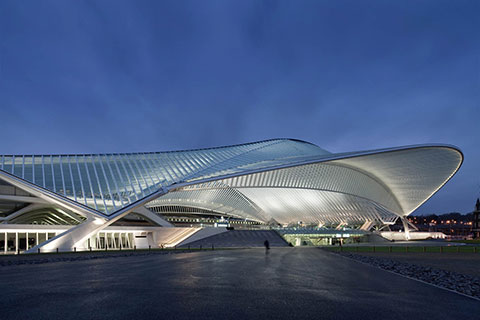
Liège is a large industrial city in Wallonia, serving as the region’s principle economic and cultural center. While its main industries are coal, steel and gunsmithing, Liège is also well known for its crowded folk festivals, nightlife, annual jazz festival, alternative cinemas, and for hosting one of the oldest and biggest Christmas markets in Belgium. The city also boasts one of Europe’s strongest digital, technological and internet-oriented services industries.
Other attractions in Liège include a range of museums, 16th and 17th century architecture, the 400-step stairway “Montagne de Bueren”, and the Saint Nicholas festival – organized by and for university students, involving dressing up in dirty lab-coats and begging for money for drinks. Liège has a pedestrian zone known locally as ‘The Square’ where you can find plenty of pubs, many of which stay open until 6am – or until the last customer leaves. Liège is also home to a large Italian community, along with large numbers of Moroccan, Algerian, and Turkish immigrants.
The city is a major educational hub, home to over 20,000 students, both local and international. The University of Liège is ranked joint 315th in the QS World University Rankings 2016-2017, and is also known for its HEC Management School. Other prominent higher educational institutions in Liège include ISA Lambert Lombard (the Faculty of Architecture of the University of Liège), the Académie Royale des Beaux-Arts de la Ville de Liège (arts school offering undergraduate and graduate courses) and La Haute Ecole de la Province de Liège (college providing undergraduate and graduate degrees).
Antwerp
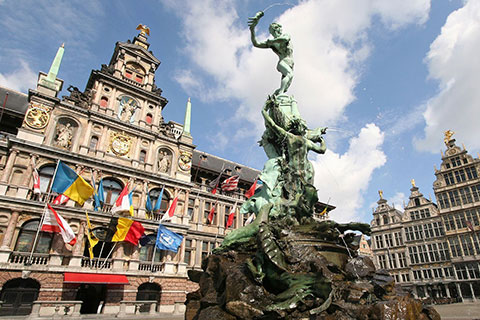
The second-largest city in Belgium, Antwerp is well-known for famous Flemish painter Sir Peter Paul Rubens, diamonds (more than 70% of all diamonds are traded in Antwerp), fashion (of particular note are the Antwerp Six) and for having the second-largest port in Europe. The city also offers a range of interesting attractions, including the Gothic Cathedral of Our Lady and the prestigious Royal Fine Art Museum, as well as many historical buildings from different periods. Even Antwerp Zoo, one of the oldest in the world, boasts impressive 19th century design and architecture.
As you might expect from its strong association with fashion, Antwerp is known as something of a trend-setter. Intellectuals, actors, musicians, writers and painters spend their time in the city’s many trendy bars, cafés and shops – or, indeed enjoying its flourishing jazz scene. Antwerp is also famous for local products such as Bolleke (an amber beer), Elixir D’Anvers (a locally made liquor), and hand-shaped biscuits (connected to local folklore).
Among universities in Antwerp, the most prominent is the University of Antwerp, ranked 209th in the QS World University Rankings and, with 14,000 registered students, the third-largest university in the Flemish region. Antwerp also has several university colleges, including Charlemagne University College (Karel de Grote Hogeschool), Plantin University College (Plantijn Hogeschool), and Artesis University College Antwerp.
Bruges
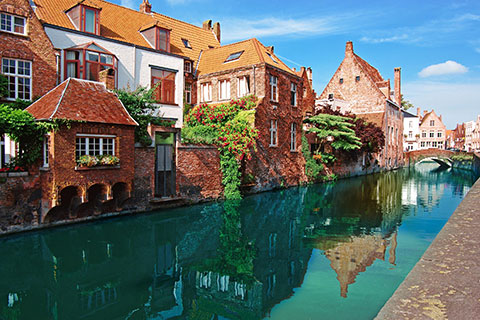
Bruges is known for being one of the most perfectly preserved medieval cities in Western Europe, and its historic city center is a UNESCO World Heritage Site. Its narrow canals and ancient buildings mean Bruges is sometimes referred to as “The Venice of the North”. The city has many famous buildings and landmarks, including an impressive 13th century belfry. Bruges also has a collection of medieval and early modern art, along with plenty of theaters, concert halls, museums and cinemas. The city is host to a range of cultural, music and food festivals and is the starting town for one of the biggest sporting events in Belgium – the Tour of Flanders cycle race.
While its constant influx of visitors gives Bruges a tourist town feel, there’s plenty for students too. The city is an important center for education, with notable universities in Bruges including the Katholieke Hogeschool Brugge-Oostende (KHBO) and the Hogeschool West-Vlaanderen (HOWEST – Howest University in English). Bruges is also the main campus for the College of Europe, which offers postgraduate studies with a focus on European economics, law and politics. Also based in Bruges is the United Nations University Institute on Comparative Regional Integration Studies (UNU-CRIS), a research and training institute of the United Nations University.
Application, Fees and Visas in Belgium
Application, Fees and Visas
Applications are sent directly to the higher education institution of your choice. Admission requirements in Belgium will vary depending on which community your institution is located. The institution will examine the submitted documentation, will check whether you are eligible for the study program or course you applied for, will inform you on whether you have to pass an admission or aptitude test, and will issue a letter of acceptance in case you are finally admitted. In general, students have to pay inscription ; on average, internationals can expect to pay anywhere between 800 and 4,000 EUR per academic year. If you are not a European citizen, you will need to apply for a student visa in Belgium before your arrival, if your stay exceeds 90 days (Type D long-stay visa). If you stay in Belgium for less than three months, then you will need a Type C short-stay visa. European nationals don’t need a visa or residence permit in order to stay and study in Belgium. You will just need to have your personal identification or passport with you during your stay and also register at the city hall after your arrival, if you intend to stay more than three months.
Fast fact
- Many belgian universities are top-ranked.
- The cities themselves provide a great experience for international students (21% of international students).
- Because Brussels houses the European Parliament, it has many international opportunities for post-degree employment and even just networking.
- In Belgium, student's performance is assessed according to a grade point scale that ranges from a minimum passing grade of 10 to a maximum of 20 points.
- University lectures usually have a fixed schedule. Your professors are all experts in their field and encourage students (particularly internationals) to ask questions. You will be involved in plenty of research work and can also join internships with local companies.




